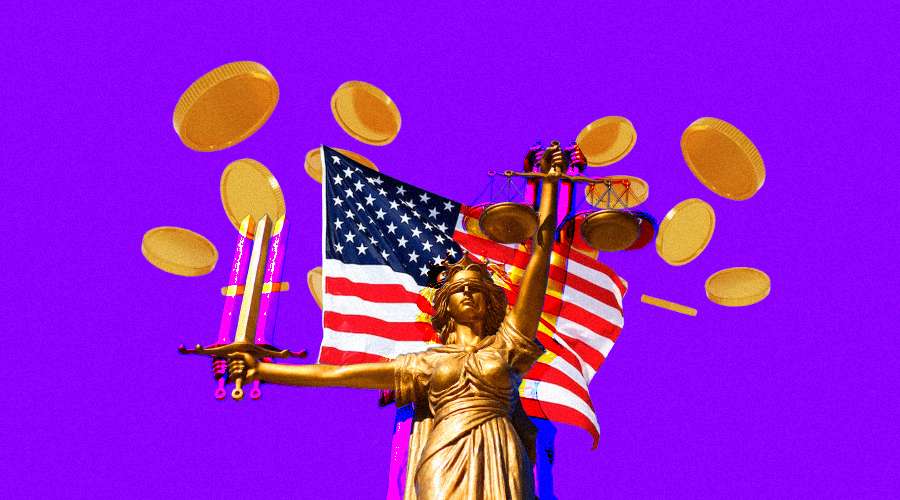Apart from the meteoric rise of Bitcoin and other cryptocurrencies, have you ever wondered, “Who’s keeping an eye on all this digital money?”
Great question!
If you’re like most people, you probably assume there’s some regulation in place.
But the regulatory landscape for cryptocurrencies in the U.S. is, to put it mildly, a complex web.
Why does this matter?
Understanding who regulates what can help you make informed decisions, whether you’re an investor, a trader, or just crypto-curious.
Trust me, you don’t want to dive into the crypto world without knowing the game’s rules.
In this article, I’ll unravel the intricate tapestry of U.S. crypto regulation for you.
We’ll explore the roles of federal and state agencies, delve into specific cases, and even look at what the future might hold.
So, keep reading if you want to know who’s who in the crypto regulatory zoo.
You’re in for an enlightening ride!

Importance of regulation in the financial sector
You might think, “Why does regulation even matter in the financial sector?”
Well, let me tell you, it’s a big deal.
Regulation is the backbone of a stable, secure, and transparent financial system.
And guess what?
This is especially crucial in the rapidly evolving world of cryptocurrencies.
- Helps protect consumers
Imagine investing your hard-earned money into a crypto asset, only to discover it was a scam.
Ouch!
Regulatory oversight aims to prevent such fraudulent activities, giving you a safety net when entering the financial markets.
- Ensures market integrity
This means that all players, big or small, have to play by the same rules.
No insider trading, no market manipulation, and no unfair advantages.
In a regulated environment, everyone gets a fair shot.
- Financial stability
Remember the 2008 financial crisis?
Lack of effective regulation can lead to catastrophic outcomes that affect not just individual investors but entire economies.
Regulatory bodies aim to prevent systemic risks that can lead to financial meltdowns.
So, regulation in the financial sector is not just some bureaucratic red tape.
It’s a vital framework that keeps the financial ecosystem healthy, fair, and secure.
And as cryptocurrencies become more mainstream, the role of regulation will only grow in importance.
Stay tuned as we dive into who is responsible for regulating Bitcoin and other cryptos in the U.S.
Recommended Read: Best crypto leverage trading platform for USA
Explanation of the decentralized nature of cryptocurrencies
You might wonder, “If regulation is so important, why is cryptocurrency often described as ‘unregulated’?”
The answer lies in the decentralized nature of cryptocurrencies.
So, what does that mean?
Let’s break it down.
Firstly, unlike traditional currencies issued by governments (think Dollars, Euros, Yen), cryptocurrencies like Bitcoin operate on a decentralized network.
This means no central authority, institution, or government controls it.
But wait, it gets even more interesting.
This decentralization is made possible through blockchain technology.
Essentially, a blockchain is a public ledger containing all transactions that have ever occurred in the network, available for anyone to see.
And because it’s decentralized, the data is stored across a network of computers rather than a central server.
You might ask, “What’s the big deal about being decentralized?”
Well, decentralization offers transparency and security not typically available in traditional financial systems.
For instance, it’s much harder to manipulate or counterfeit cryptocurrencies.
However, this lack of central authority also presents challenges for regulation.
Who is responsible for overseeing a network that no one and everyone simultaneously owns?
How do you enforce laws on a global, decentralized system?
While the decentralized nature of cryptocurrencies offers numerous benefits, it also complicates the regulatory landscape.
And that’s precisely why understanding who regulates Bitcoin and other cryptos in the U.S. is so crucial.
Keep reading as we delve into the nitty-gritty of crypto regulation in the United States.
The challenge of regulating digital assets

So, you’ve got a handle on why cryptocurrencies are hard to pin down from a regulatory standpoint.
But let’s dig deeper into the challenge of regulating digital assets.
Trust me, it’s a topic that’s worth your attention.
- Jurisdiction
Traditional financial systems are usually confined to specific countries or regions, making enforcing laws easier for local regulators.
But cryptocurrencies?
They’re global from day one.
This means that even if one country imposes strict regulations, the technology’s decentralized nature allows operations to move elsewhere simply.
- Ever-evolving landscape of digital assets
We’re not just talking about Bitcoin or Ethereum anymore.
There are thousands of other cryptocurrencies, each with unique features and purposes.
Some are designed for fast transactions, others for anonymity, and others for smart contracts.
How do you regulate such a diverse ecosystem?
- March of technology
The technology behind these digital assets is also rapidly evolving.
We’re seeing the rise of decentralized finance (DeFi), non-fungible tokens (NFTs), and other innovations that are pushing the boundaries of what we understand as “financial products.”
This constant innovation makes it difficult for regulations to keep up.
The challenge of regulating digital assets isn’t just about their decentralized nature.
It’s a complex web of jurisdictional issues, technological advancements, and the sheer diversity of the assets themselves.
And that’s why figuring out who regulates Bitcoin and other cryptos in the U.S. is such a hot topic.
Stick around as we explore the key players in the U.S. who are stepping up to this regulatory challenge.
Recommended Read: How & where to trade crypto futures in the USA?
Federal Regulatory Bodies

Alright, now that we’ve set the stage for why regulating cryptocurrencies is such a complex issue, let’s dive into the key players in the U.S. who are taking on this monumental task.
Trust me, you’ll want to know who’s who in the regulatory landscape.
- Securities and Exchange Commission (SEC)
You might think of them as the watchdogs of Wall Street, but they’ve also got their eyes on crypto.
The SEC is primarily concerned with determining which digital assets qualify as securities.
And if they do, companies must comply with SEC regulations, including registration and disclosure. And here are some crypto exchanges that followed SEC regulations.
- Commodity Futures Trading Commission (CFTC)
This agency oversees the derivatives markets, and guess what?
They consider cryptocurrencies like Bitcoin to be commodities.
This means that Futures and Options markets for cryptocurrencies fall under their jurisdiction.
- Internal Revenue Service (IRS)
While they may not regulate cryptocurrencies per se, they’re very interested in your digital assets come tax time.
The IRS has issued guidelines on how cryptocurrency transactions should be reported for tax purposes. And you must know if the IRS can track crypto.
- Financial Crimes Enforcement Network (FinCEN)
This agency is focused on combating money laundering and other financial crimes.
They’ve issued guidelines stating that cryptocurrency exchanges must register as money services businesses and comply with anti-money laundering (AML) laws.
- Office of the Comptroller of the Currency (OCC)
This agency regulates national banks, and they’ve been increasingly open to banks providing services for digital assets.
They’ve even issued guidance allowing national banks to hold stablecoin reserves.
State-level regulations: Case study: New York’s BitLicense
So, you’ve got a handle on federal agencies and their roles.
Now, let’s zoom in on state-level regulations, and there’s no better place to start than New York’s infamous BitLicense.
New York State introduced the BitLicense in 2015, one of the first attempts by a U.S. state to regulate digital currency activities.
The BitLicense is administered by the New York State Department of Financial Services (NYSDFS), and it’s required for any business that wants to engage in cryptocurrency activities within the state.
Well, the BitLicense has been both praised and criticized.
On one hand, it’s seen as a pioneering regulatory framework that provides legal clarity.
Companies that secure a BitLicense are often viewed as more legitimate and secure, which can be a significant advantage in a market still finding its footing.
However, the application process for a BitLicense is notoriously rigorous and expensive.
We’re talking about extensive background checks, hefty fees, and ongoing reporting requirements.
This has led some businesses to avoid operating in New York altogether.
Critics argue that BitLicense stifles innovation and scares away startups that can’t afford the cost and complexity of compliance.
The BitLicense case serves as a fascinating case study of how state-level regulations can promote and hinder cryptocurrency adoption.
It’s a double-edged sword that reflects the broader challenges of regulating this rapidly evolving space.
Upcoming legislation and regulatory proposals
Just when you thought you had a grasp on the current regulatory landscape, hold on tight because there’s more on the horizon.
Upcoming legislation and regulatory proposals are shaping up to be game-changers.
And trust me, you’ll want to be ahead of the curve on this one.
- Cryptocurrency Act of 2020
This act aims to clarify which federal agencies should regulate digital assets.
Although it hasn’t been passed yet, the bill proposes that cryptocurrencies be categorized into three types:
- Crypto Commodities
- Crypto Currencies
- Crypto Securities.
Each category would fall under the jurisdiction of a specific regulatory body, making the whole process more streamlined.
- Token Taxonomy Act
This is another bill that’s been making waves.
It aims to exempt specific tokens and digital assets from federal securities laws, which could open the door for more innovation and investment in the crypto space.
- Stable Act
This act aims to regulate stablecoins, a type of cryptocurrency designed to have a stable value by being pegged to a reserve like the U.S. dollar.
This act would require stablecoin issuers to obtain a banking charter and adhere to the same regulations as traditional banks.
These are just a few examples.
Numerous other bills and proposals are in the pipeline, each with the potential to significantly impact the crypto industry.
The legislative landscape constantly evolves from anti-money laundering regulations to consumer protection measures.
So, what does this mean for you?
Keeping an eye on upcoming legislation is crucial for anyone involved in crypto.
Challenges and opportunities for future regulation

Well, the future of crypto regulation is a mixed bag of challenges and opportunities.
Let’s dive in, shall we?
First off, the challenges.
One major hurdle is the global nature of cryptocurrencies.
Unlike traditional financial systems, crypto doesn’t respect national borders.
This makes it incredibly difficult for any single country to regulate it effectively.
And here’s another thing: the rapid pace of technological innovation in the crypto space often outstrips the slower, more deliberate pace of legislative action.
This mismatch can lead to regulatory gaps or outdated laws that fail to address current realities.
But hold on, it’s not all doom and gloom.
There are significant opportunities as well.
One of the biggest is the potential for regulatory frameworks to attract investment and innovation.
Countries establishing fair crypto regulations can become hubs for blockchain technology and digital assets.
Take Switzerland, for example, which has become a global center for crypto innovation thanks to its progressive regulatory approach.
Moreover, effective regulation can also enhance consumer protection and reduce the risk of fraud and scams in the crypto space.
This could make digital assets more appealing to mainstream investors and the general public, thereby driving adoption.
And let’s not forget the potential for collaboration between regulatory bodies and the crypto industry.
Through open dialogue and partnership, it’s possible to create regulations that protect consumers and encourage innovation.
The road to crypto regulation is fraught with challenges but paved with opportunities for those willing to engage constructively.
The key is to balance oversight and freedom, a task easier said than done.
But one thing’s certain: today’s decisions will shape the crypto landscape for years.
So, stay informed and be prepared for what’s coming down the pike.
Recommended Read: Why are many crypto futures exchanges banned in USA?
Conclusion
Regulating Bitcoin and other cryptocurrencies in the U.S. is no small feat.
The decentralized nature of these digital assets presents a unique set of challenges for regulatory bodies.
From federal agencies like the SEC and CFTC to state-level initiatives like New York’s BitLicense, various entities are grappling with bringing this new asset class into the regulatory fold.
But despite the complexities, regulation is not necessarily a bad thing.
It can protect consumers, attract investment, and foster innovation.
The key lies in crafting effective and flexible rules to adapt to a rapidly evolving landscape.
As we look to the future, it’s clear that the regulatory landscape is far from settled.
New legislation is on the horizon, and the ongoing dialogue between the crypto industry and regulators will undoubtedly shape the path forward.
So, keep your eyes peeled and your ears open.
The world of crypto is changing fast, and the regulatory decisions made today will have long-lasting impacts on tomorrow’s digital economy.
Stay tuned because this is a story that’s far from over.
